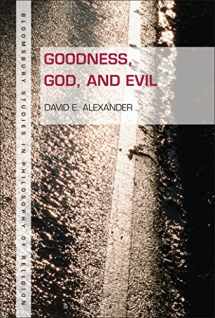
Goodness, God, and Evil (Bloomsbury Studies in Philosophy of Religion)
ISBN-13:
9781628921663
ISBN-10:
1628921668
Edition:
NIPPOD
Author:
David E. Alexander
Publication date:
2014
Publisher:
Bloomsbury Academic
Format:
Paperback
168 pages
Category:
Semantics
,
Words, Language & Grammar
,
Philosophy
,
Religious Studies
,
Ethics & Morality
,
Philosophy
FREE US shipping
Book details
ISBN-13:
9781628921663
ISBN-10:
1628921668
Edition:
NIPPOD
Author:
David E. Alexander
Publication date:
2014
Publisher:
Bloomsbury Academic
Format:
Paperback
168 pages
Category:
Semantics
,
Words, Language & Grammar
,
Philosophy
,
Religious Studies
,
Ethics & Morality
,
Philosophy
Summary
Goodness, God, and Evil (Bloomsbury Studies in Philosophy of Religion) (ISBN-13: 9781628921663 and ISBN-10: 1628921668), written by authors
David E. Alexander, was published by Bloomsbury Academic in 2014.
With an overall rating of 4.1 stars, it's a notable title among other
Semantics
(Words, Language & Grammar , Philosophy, Religious Studies, Ethics & Morality, Philosophy) books. You can easily purchase or rent Goodness, God, and Evil (Bloomsbury Studies in Philosophy of Religion) (Paperback) from BooksRun,
along with many other new and used
Semantics
books
and textbooks.
And, if you're looking to sell your copy, our current buyback offer is $3.89.
Description
Most contemporary versions of moral realism are beset with difficulties. Many of these difficulties arise because of a faulty conception of the nature of goodness. Goodness, God, and Evil lays out and defends a new version of moral realism that re-conceives the nature of goodness. Alexander argues that the adjective 'good' is best thought of as an attributive adjective and not as a predicative one. In other words, the adjective 'good' logically cannot be detached from the noun (or noun phrase) that it modifies. It is further argued that this conception of the function of the adjective implies that recent attempts to provide necessary a posteriori identities between goodness and something else must fail. The convertibility of being and goodness, the privation theory of evil, a denial of the fact-value distinction, human nature as the ground of human morality and even a novel argument for the existence of God are some of the implications of the account of goodness that Alexander offers.


We would LOVE it if you could help us and other readers by reviewing the book
Book review

Congratulations! We have received your book review.
{user}
{createdAt}
by {truncated_author}


